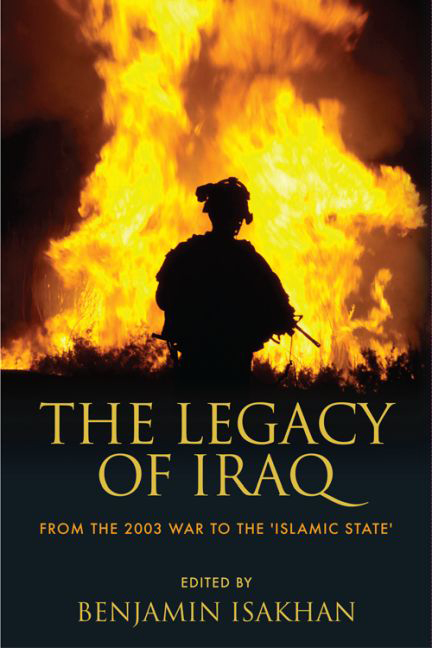Book contents
- Frontmatter
- Contents
- Acknowledgements
- Notes on Contributors
- Introduction: The Iraq Legacies – Intervention, Occupation, Withdrawal and Beyond
- Part I The Aftermath of War: Strategic Decisions and Catastrophic Mistakes
- Part II Iraqi Politics since Saddam
- 4 Shattering the Shia: A Maliki Political Strategy in Post-Saddam Iraq
- 5 The Dangerous Legacy of a Flawed Constitution: Resolving Iraq's Kurdish ‘Problem’
- 6 Between Aqalliya and Mukawin: Understanding Sunni Political Attitudes in Post-Saddam Iraq
- 7 Post-withdrawal Prospects for Iraq's ‘Ultra-minorities’
- Part III The Plight of Iraqi Culture and Civil Society
- Part IV Regional and International Consequences of the Iraq War
- Conclusion: The Iraq Legacies and the Roots of the ‘Islamic State’
- References
- Index
7 - Post-withdrawal Prospects for Iraq's ‘Ultra-minorities’
from Part II - Iraqi Politics since Saddam
Published online by Cambridge University Press: 25 October 2017
- Frontmatter
- Contents
- Acknowledgements
- Notes on Contributors
- Introduction: The Iraq Legacies – Intervention, Occupation, Withdrawal and Beyond
- Part I The Aftermath of War: Strategic Decisions and Catastrophic Mistakes
- Part II Iraqi Politics since Saddam
- 4 Shattering the Shia: A Maliki Political Strategy in Post-Saddam Iraq
- 5 The Dangerous Legacy of a Flawed Constitution: Resolving Iraq's Kurdish ‘Problem’
- 6 Between Aqalliya and Mukawin: Understanding Sunni Political Attitudes in Post-Saddam Iraq
- 7 Post-withdrawal Prospects for Iraq's ‘Ultra-minorities’
- Part III The Plight of Iraqi Culture and Civil Society
- Part IV Regional and International Consequences of the Iraq War
- Conclusion: The Iraq Legacies and the Roots of the ‘Islamic State’
- References
- Index
Summary
The signing of Iraq's Transitional Administrative Law (TAL) on 8 March 2004 ushered in a new, more pluralistic era for Iraq. It was now a ‘country of many nationalities’ (Article 7B). Minority languages such as ‘Turcoman, Syriac and Armenian’ were now allowed to be offi cially taught in government institutions (Article 9) and ‘the administrative, cultural and political rights of the Turcomans and ChaldoAssyrians and all other citizens’ were now guaranteed by law (Article 53D). In addition, all Iraqi citizens were equal in their rights ‘without regard to gender, sect, opinion, belief, nationality, religion, or origin’; ‘discrimination on the basis of gender, nationality, religion, or origin’ was prohibited (Article 12); and it was outlawed for any Iraqi to be discriminated against in election voting ‘on the basis of gender, religion, sect, race, belief, ethnic origin, language, wealth, or literacy’ (Article 20B).
‘Ultra-minorities’ have often been regarded as the proverbial canaries in the coal mine (Griswold 2010) – a barometer of pluralism and democracy in the ‘new Iraq’ (Chung 2012; Lewis 2003). In a speech delivered on 7 October 2002, prior to the United States-led military intervention, President George W. Bush stated: ‘The oppression of Kurds, Assyrians, Turkomans, Shia, Sunnis and others will be lifted.’ During the years since then, however, Chaldo-Assyrians, Turkmens, Shabaks, Yazidis, Sabaean Mandaeans and others have emerged as among the most vulnerable of the country's citizens, and their prospects after the withdrawal of Coalition troops remain bleak. This chapter will explore the successes and failures of this period with regard to Iraq's ethnic, linguistic and religious minorities, referring especially to recent human rights reports, making for a valuable case study in the way contemporary states deal with their minority groups.
Iraqi Elections and the Quota System
In January 2005, Iraq experienced its fi rst democratic elections. During this process, however, Chaldo-Assyrian, Shabak, Turkmen and Yazidi villages around Mosul experienced interference and injustice due to fraud, intimidation, and the refusal by Kurdish security forces to permit ballot boxes to be distributed in their areas (United States Commission on International Religious Freedom 2008). Moreover, some villages received no ballots, and others that did receive them were not given their designated boxes. In other areas, the buses promised for voter transportation failed to materialise. In one place, the polls opened from 11 a.m. to 2 p.m. only.
- Type
- Chapter
- Information
- The Legacy of IraqFrom the 2003 War to the 'Islamic State', pp. 110 - 122Publisher: Edinburgh University PressPrint publication year: 2015



